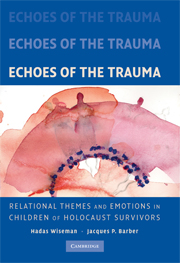Book contents
- Frontmatter
- Contents
- Foreword by Dan Bar-On
- Preface
- Acknowledgments
- 1 Introduction – A Narrative Approach to Bridging the Gap between Clinical Case Studies and Empirical Research on Children of Holocaust Survivors
- 2 Studying Relationship Narratives with the Core Conflictual Relationship Theme Method
- PART ONE RELATIONAL THEMES IN THE NARRATIVES
- PART TWO EMOTIONS IN THE NARRATIVES
- PART THREE HEALING TRAUMA IN THE CHAIN OF THE GENERATIONS
- Appendix
- References
- Index
Foreword by Dan Bar-On
The Internal Echoes of Holocaust
Published online by Cambridge University Press: 29 July 2009
- Frontmatter
- Contents
- Foreword by Dan Bar-On
- Preface
- Acknowledgments
- 1 Introduction – A Narrative Approach to Bridging the Gap between Clinical Case Studies and Empirical Research on Children of Holocaust Survivors
- 2 Studying Relationship Narratives with the Core Conflictual Relationship Theme Method
- PART ONE RELATIONAL THEMES IN THE NARRATIVES
- PART TWO EMOTIONS IN THE NARRATIVES
- PART THREE HEALING TRAUMA IN THE CHAIN OF THE GENERATIONS
- Appendix
- References
- Index
Summary
This book makes an important contribution to the growing literature on the aftereffects of the Holocaust on the families of its survivors – mainly the second generation. Its special focus is on the intergenerational relations between the members of these families. To study these relations the authors applied the Core Conflict Relational Theme (CCRT) method to interviews that focused on interpersonal relations within these families. By doing so, the authors avoided unnecessary assumptions about “pathologies” in these families. Their qualitative approach also avoided the tendencies of some recent quantitative studies that claim that there are no such aftereffects within families of survivors, studies that undermine what voices within the second and third generations tell us and the echoes these stories have within us. Wiseman and Barber tell us how the echoes of that horrible period still resonate among hundreds of thousands of its survivors, their children, and their grandchildren.
In a certain sense, the variety of studies and their sometimes contradictory results represent the different assumptions researchers make about the human beings they study, more than the phenomena they study itself. Just as economists make assumptions about the possibility of predicting human behavior based on the expressed wishes of these people to purchase certain products, some clinical psychologists used uncritically psychoanalytic terminology related to “pathologies” of survivors of the Holocaust; this terminology was developed by Freud to depict abnormal reactions to normal situations (Bergmann & Jucovy, 1982).
- Type
- Chapter
- Information
- Echoes of the TraumaRelational Themes and Emotions in Children of Holocaust Survivors, pp. ix - xivPublisher: Cambridge University PressPrint publication year: 2008



